|
by Camela Thompson
The last time I went to a book club meeting to speak about All the Pretty Bones I mentioned my day job. The reaction was flattering. People thought I would be writing full time with a novel out the door. The sad reality is that the medium income of novelists was estimated at $5,000 per year with over a third of published authors under $500 per year. I joke that my royalty checks are my means to support my book habit, but I'm not even there yet. Notice I said "yet." I'm not sure if it's optimism or my stubborn streak, but I'm determined to keep working at it. I also intend to keep working full time to maintain our standard of living until I make it as an author. Finding Time to Write Last weekend I attended the Write Here Write Now conference held by the Seattle 7 Writers. If you are in the Seattle area, I highly recommend it. The conference is great for several reasons, but I especially appreciate the opportunity to hear published authors offer advice. At one point, the question was, "How do you find time to write?" Dave Boling explained that if writing was an essential part of your being, you make time. Even if it means writing on a flight, during the commute to work, or after the kids go to bed - writers find a way. One of the authors speaking the prior year was a physician with young twins and she still produced multiple novels per year. I have explained that I need to write. It calms me. My husband seems to understand this and lets me retreat into my alternate world for hours at a time. However, it's not always possible for me to sit down after a full day of work and write more words. On those days, I focus on lining up my social media material for the week. There are also stretches of time when my need to write leaves me. A weekly writing group helps me commit to at least two hours of writing per week. An Average Weekday I work for a large corporation as a CRM administrator and analyst. The day is divided between meetings, redesigning process flows, and writing code. It's challenging, but rewarding. If I do my job well, I make it easier for other people in the company to do their own job. I'm lucky - I can squeeze in some social media work between tasks. When I first get in, I find quotes and images, then schedule posts for Facebook and Twitter. After a full day of work, I feed the dog, walk the dog, and start on dinner. I spend an hour on social media, then I write until it's time for bed. I average an hour to an hour and a half of writing per weekday. Support Structure I work a lot. It's easy to burn out. My husband is really good about taking on extra house work. Our house would be a disaster if he didn't. There are days I start writing and the rest of the world drops away. I forget to eat, and he steps in without complaint or asking. A wife absorbed in her writing isn't fun, but he knows that I'm working hard. I hope that I'll be able to spend my day writing and have more normal evenings eventually, but it's working for now. My writing group and critique groups are awesome. Sometimes the biggest help is the opportunity to share writerly woes and commiserate. Writing is a solitary activity until the first or second draft is done. It's up to me to sit my butt in a chair and write until the book is finished. I have to figure out how to stay motivated and not buckle when I inevitably begin to question my work. Finding the time and drive to keep going is up to me, but a little bit of help from others goes a really long way.
12 Comments
by Camela Thompson When I talk to friends, they ask me if I'm scared of running out of ideas. So far, the ideas haven't been a problem. I have stack of concepts with rough outlines. Getting to know the characters is harder, often happening gradually as I write out the story (I haven't figured out how to adequately "outline" a character - their little quirks and preferences gain clarity as I write). Most of my early revisions involve reworks due to solidifying the characters. I realize the character wouldn't do what is convenient for the plot and need to be coerced into action. This takes time, but it isn't what I would call difficult. The hard part is forcing myself to ignore my inner critic. I have days when a scene will pop into my head so clearly it's like a movie reel. I wish I could say this happens all the time, but in truth the majority of my days are spent talking myself into writing. Finding things to clean or fix are common stall tactics. While I nervously glance at my laptop, I have a list of recriminations firing at me from my inner critic. The second book won't live up to expectations set by the first. The story isn't good enough. You don't belong. You aren't good enough. A bit dysfunctional, isn't it? But I put it out there because I don't believe I'm the only person who is self critical, and I realize that I am a perfectionist - and I don't mean that in the bragging I-do-everything-well kind of way. This is more of an I'm-glad-I-have-a-licensed-therapist confession. It is very hard to turn off the inner critic while doing anything - even laundry. I'll be honest and admit to some abnormal behaviors. I have a sorting system to aid with efficiency. It's my least favorite chore because it takes so long and it's easy to get distracted. Getting distracted means that I forget about laundry and it sits too long while I perform 15 other activities. If it sits too long, it means it's wrong. I am really lucky because my husband has taken charge of that chore. My writing assistant reminding me that it's break time. If I don't listen, she will make writing harder. If I'm weird about laundry, you don't want to know what goes through my head while I'm at work or writing. It makes me very good at my job as an analyst - I'm good at managing timelines and mistakes are rare because of all of the double checking that I do. When it comes to writing and artwork, it's more of a hindrance than a help. Creative processes are stunted by a rigid or formal structure. A different part of the brain is used for weaving a story than editing - and the analytical part of my brain has a hard time letting go of being in control. I'm constantly looking for grammatical quirks and personality flaws in my characters.
The hardest part for me is the beginning of a novel. If I let myself, I will spend months reorganizing chapters, rewriting, and editing. It's my abyss. Every author is told that the first chapter has to grab the reader's attention. The analyst in me has embraced that concept and taken it a little too far. Nanowrimo (a November goal of writing 50,000 words in a month) was a great exercise for me. There were days that I wanted to do nothing but edit the crappy chapter I had just written, but to hit my daily quota, I was forced to ignore the chapter and keep going. When I was finished with the 50,000 words, I allowed myself to go back and make the edits that were nagging me. And you know what? Those "awful" chapters weren't bad. They needed rework, but they were still necessary to move the plot forward. When I can let go of the need for perfection, the creative part of my brain takes me to places that I wouldn't have thought possible. Strange creatures come to life, dark things unfold, and my characters shine despite the cracks in their armor. If I can bring what I learned from NANOWRIMO back into practice, my stories will be better off. Do you struggle with perfectionism? Do you feel it has aided or held you back? by Camela Thompson I honestly wasn't sure where I stood on social media as an author before last week. I have been on Facebook for years to stay connected to friends and family. Obviously, there was a perceived benefit on a personal level. I like sharing photos and seeing what other people are up to. After using social media in the traditional sense for so many years, it was hard for me to understand how a small business or an author with zero connections would even get started. I'm sure I've made some mistakes, but I researched before joining. I knew to keep my profile picture consistent, develop a tag line and description, never blast direct messages, and not talk too much about my book. After months of usage, I could attribute one sale to my new Twitter account, but most of my early sales were a result of my personal Facebook friends. Not a very strong argument for dedicating hours to social media, is it?
Everything changed when I decided to put my book on sale. My publisher makes it easy for their authors to network. We have a private page where we can announce sales and new launches with requests for social media shares. When authors interact with me on Twitter or retweet my posts, I try to return the favor. I have a modest network, but there are several people I have met online who are really cool. When I had my own sale to promote, the first day I relied on paid and free promotion services. I managed to crawl up to the number 11 spot in my categories on Amazon (so cool!). It motivated me to ask my publisher network and Twitter friends to spread the word about my sale. I was surprised by the number of people who helped. My twitter notifications blew up. My sales were boosted, too. All of those months building relationships paid off. Social Media does not work if you join and only expect to post promotional material about your book. Use it to network and connect to your reader base. Participate in things like #MondayBlogs, #WWWBlogs, and other chat events on Twitter. Read other people's posts and learn what works for them. Find book clubs on Facebook for your genre and participate in conversations about books that aren't your own. Author takeovers on Facebook are a lot of fun. Attend a couple and take notes - which posts get the most interaction? The goal is to form each post with a call to action or question to get more opportunity for reader interaction. These things may not lead to immediate sales, but being kind to others and talking about similar interests lead to good things. Have you had positive interactions with readers or authors on social media? Are there things you appreciate or wish people did less as it pertains to authors? by Camela Thompson When I knew my first book was nearing its publication date, I made a decision to host a party to celebrate publishing a book rather than a traditional reading. A very small part of my motivation might have been my reluctance to talk to book stores about my first book without the ability to offer numerous reviews, but I could have gotten around that by doing the reading at a bar or coffee shop. I wanted to celebrate the achievement with my friends. For me, it was about the book, but the focus was on the accomplishment. The result was a great time, but I did learn a few lessons. My favorite picture with my wonderful editor (and talented author) Patricia D. Eddy and the hilarious Booktrope author of Zues is Dead: A Monstrously Inconvenient Adventure, Michael G Munz Scope Out the Location Before Hosting
We rented a room at a restaurant sight unseen. It turned out pretty well, but I didn't realize it wasn't wheel chair accessible until fifteen minutes before go time. The room was long and narrow and it made it a little difficult to walk around and socialize, but it worked out. Order Lots of Books I had forty people scheduled to attend, and we had about that many people pass through the event. Twenty books was not enough and I sold out quickly. It's a great problem to have, but there were a few more sales that could have been had if there were more books on hand. It was also a good thing my husband and I went into this expecting to spend way more than we could possibly generate in sales. An Open Tab Means Less or No Profit We decided to host the party at a restaurant that is known for catering to people with allergies. They specialize in Italian food and we decided to order primarily pizza, salads, and sides. We went into it knowing that we would spend far more than we would make, but we wanted a party. If you want to make a profit, hold your launch in a bar or coffee shop and do not open a tab. The tab will get you more attendees - which is good! - but it will eat into your profit margin until there is none. Bring Migraine Meds Bring all the medications, actually. Publishing a book is very stressful even if it is exciting, and stress can trigger health issues. There's also Murphy's Law to consider. If you bring your medications, you probably won't need them. Next time I will host a traditional reading, but I have zero regrets about this party. It was a tremendously good time and it was so great to see my friends. The amount of support everyone offered was amazing and I left feeling inspired to keep going. It was a truly wonderful experience. Have you attended or hosted a launch party? What did you like or not like about the event? As a prolific reader, I understand the subjective nature of books. And I might have a problem. Most surfaces in my house are covered in books... by Camela Thompson Several communities that revolve around literature have been buzzing from a recent article involving an author with an unhealthy and somewhat unnerving interaction with an online reviewer. Since this article was posted, I have read blog post after blog post exploring every angle. I've seen book bloggers swear off reviews, authors swear off interacting with reviewers, and reviewers recounting their own horror stories. After reading all of these posts, I walked away with a healthy amount of fear. Should I follow advice and ignore reviewers, or thank them for their time? The minute I made the decision to publish, it was with the realization that my writing would be judged countless times from that moment forward. Agents and editors would have the opportunity to evaluate the premise and decide whether or not they were interested in any more material. Those who decided to read more would have the opportunity to judge those extra pages and determine whether to request more material or pass on my work. Then publishers would review the material - the one I signed a contract with sent my manuscript off to a panel of volunteer readers to help gauge the market appeal of my book. Once it made it past the publishing process (edit, revise, edit, revise, proofread, revise, proofread), it was time for the really scary part. Would the readers like it? I'm human and I care about what people think. I have also read and reviewed many books and realize that fiction literature is a very subjective thing. I have genre and character preferences that don't always fall in line with popular opinion. I've read books and read other people's reviews and wondered what planet I was on when I read the same book they were talking about because I walked away with a vastly different opinion. This isn't a bad thing. In fact, it's one of the many things that makes reading so exciting. Each person walks away with something different. The right response to a review might be to say nothing at all. I personally believe this is true for Goodreads and Amazon reviews. When I review a book on these websites, I don't expect to hear from the author. I'm not as sure about how to interact with book bloggers. They spend a lot of time not only reading the book, but posting about it. It may be okay to post a professional thank you (and by professional I mean never argue with or comment on their assessment - just a thank you for their time).
I have decided to stay silent for the most part, but this doesn't mean I'm not thankful. Each time someone reads my book, they are dedicating time that could be spent elsewhere. When I decided to put my book out in the world, it was with the understanding that it is my responsibility as an author to respect the opinions of others. When you write a review, what do you prefer? Do you have a blog and feel different about responses to a blog post versus something posted on Amazon or Goodreads? See what reviewers are saying about All the Pretty Bones. by Camela Thompson When I first started day dreaming about publishing a book, I was under the impression that I would hand my polished manuscript to an agent and they would do the rest. That's laughable now. I hear agents are wonderful, but the author is still involved in editing and, more often than not, the burden of marketing lands on the author's shoulders. Not many authors have publishers pouring money into advertising, and it's our job to figure out how to get our book in front of the public. This is easier for authors lucky enough to have an established reader base, but us newbies have to work hard to earn every reader. I am lucky that Booktrope, my publisher, has me work with a book manager. Her efforts were instrumental in turning around an online launch that looked doomed to fail. Sometimes doing things the wrong way teaches us the biggest lessons, and I was lucky to have someone swoop in and save the day. Facebook Launch? A Facebook launch party actually occurs on Facebook, not at a physical location. People meet online at a designated time and the author posts excerpts, contests, and a lot of related content. It is a great way to reach people outside of your personal network - across the country and even internationally. Just remember to start the event from your author page (oops - you can't change this once you set it up). Join online book clubs that post launch party announcements and attend at least one before you throw your own. For more information on Facebook launches and some great advice, click here. Social Media Works. Sometimes. Social media is crucial for authors. It's a wonderful way to meet people, learn tricks of the trade, and network. I swore I would never join Twitter, and now I love it. That said, it does not generate sales. I've met a lot of authors, had some great dialogue, and laughed out loud at some pictures and quotes. I do use it from time to time to notify people that I have an event coming up and I'm not shy about retweeting flattering posts, but it didn't help me get more launch party attendees. What did work was joining Facebook book clubs that focus on my genre and allow promotional posts. I joined several groups and posted once or twice about the event with details on a contest we started a week in advance of the launch date. Teaser Graphics are Crucial The only time I did get responses to launch party announcements was when I included a graphic with a teaser quote. I followed the instructions from Page Curl (click here) and came up with a few quotes that I thought were intriguing and matched them up to graphics that matched my storyline. Contests
When you set up your online Facebook Launch page, start a contest that rewards people for inviting people to your launch. Attendees are the most important part of the party, so make the reward a good one (a free ebook and a gift card to Amazon or Starbucks is a great idea). Set up a poll in a comment and leave it open for people to add their own "answers." This will allow people to add the name of the person who invited them and vote for them. The person with the most votes by the beginning of your party wins. It also doesn't hurt to have a contest for an Amazon gift card for people who purchase the book before the launch party. It helps to have people familiar with your book when you open up dialogue in your launch party, and people have incentive to buy the book. Other contest ideas:
Plan Your Content To keep a good amount of comments and dialogue going, plan to post every fifteen minutes. Posting excerpts, photos, and other content related to your book is great, but make sure the posts are engaging and allow for continued interaction. Each time you ask a question, you open up an opportunity for readers to respond. Make sure to monitor all of the comments, respond to them, and pose thoughtful questions. Guest Authors If you know anyone who has published a book that is related to your own genre, this is a great way to get some cross promotion. They attend so their readers are invited and you have a break for an hour during the launch. Launch parties typically run at least five hours, and generating content and monitoring those comments and responses is exhausting. Scheduling guest authors is a great way to get a break. Don't know any authors? Get on Twitter and Facebook and strike up some connections! Conclusion I made some missteps and was clueless about how to get more attendees. My book manager immediately set up a contest to generate more attendees and taught me about Facebook book club groups. In four days she took my attendee count from 10 to 162, which was awesome. I believe the launch went well because we had a lot of interaction with attendees and hundreds of comments. There were some really great conversations and I had a lot of fun! It did generate a modest amount of sales, but the important thing was that it did get my name out there. For that I am grateful. Have you attended a Facebook launch you enjoyed? What did you like about it? Have you hosted a Facebook launch? What were your take aways? My first time seeing the books made it a little more real. by Camela Thompson
When I first started writing, I never really considered getting published. It was a distant possibility, as far away as the stars in the sky. I didn't think of the odds stacked up against me. If I had, I wouldn't have been able to write. It's too discouraging. The minute you tell people you want to be a writer, they are really eager to share how hard it is to be published. It's tremendously encouraging <- that was sarcasm (Seriously - it's like going to a baby shower and listening to every woman in the room recount their most horrifying birthing ordeals in front of the terrified new mom). In order to keep writing, I let ideas turn into scenes. Characters demanded to go through their trials. Stories haunted me until I sat down and started typing. All the Pretty Bones is not the first book I have written, but it was the first time I had this feeling that I was on to something. People would ask me what it was about and lean forward when I gave a quick two to three line description. Their reaction made me think, "Wow. Other people might want to read this!" When it was finished, I shared it with my beta readers (special thanks to Z.D. Gladstone, Stephanie, and Christy for their tremendous insight). Once the major issues they raised were addressed, I decided to pitch at a writing conference I was already scheduled to attend. I am a very analytical person who loves to be prepared. Deciding anything on a whim, particularly pitching a novel, is very stressful. In the week leading up to the conference, I crammed by researching agent posted recommendations for pitches and queries (Writers Digest has a fabulous list of successful query letters posted by agents). There were so many things to learn! It was the first time looking at my book as a product instead of this organic thing that shot forth from my brain. By the time I sat in front of an editor, I had convinced myself that I was as prepared as possible, but my odds were low. After stumbling across agent after agent expressing their vampire fatigue, my odds became downright improbable. Imagine my surprise when my first meeting went well. I met with an editor representative of Booktrope, a small publishing company based in Seattle. She was kind and easy to talk to. I'm sure she could sense my nerves, but with her encouraging smile, it was easy to jump straight into my pitch. When she leaned forward and started asking questions with a grin on her face, I had hope. When she said, "This is very marketable and I really hope we hear from you," I almost did cartwheels on the way out the door. I was so excited I was shaking and I don't think I slept for four days (that actually turned out to be an issue with hyperthyroidism, but it all worked out). I still had to get through a sample chapter review, and then my manuscript was submitted to a team of readers to give me a thumbs up or down. For some reason, I had a really good feeling - and it ended in a contract. What I have learned about the publishing process and author expectations pre- and post-publication could fill several blog posts, and there is still so much to learn! It has been an amazing experience, and Booktrope has been fabulous. Writers get beat up on the road to being published. I don't think I'm the only author out there that came out on the other side with a deficit in confidence, and I had it pretty easy. I've seen the pain that comes with rejected queries and pitches that end badly. Please keep trying. The difference between a successful author and a retired writer is perseverance. Good luck, and keep writing. See what people are saying about All the Pretty Bones on Amazon. by Camela Thompson There are several books that left a lasting impression on me. If the book was really good, finishing it came with a weird sadness. I had rushed to get through it because I had to know what was next. Then came the regrets. Maybe if I had stretched it out a little longer, I would remember more. It's like sitting down to a favorite piece of cake. I grabbed the smaller piece so I wouldn't feel sick from gorging myself, but now it's gone and I'm pressing my thumb into the crumbs so I can get every last morsel. (Yeah, don't look at me like you've never done that when no one was watching.) Once it was over, I couldn't help but wonder if my favorite character was based on the author's close friend or a lover. It brought me hope to think someone so awesome existed in the world. Now that I've been writing for a while, I no longer ask those questions. Taking people straight from this world and putting them in fiction doesn't work very well. First of all, if we're writing from a character's perspective, we're expected to know them so well that we can see into their brains. I have yet to meet a real life Sookie Stackhouse, so I'm putting this in the "not possible" category. If authors base characters on real people, they're still manipulating them like giant puppeteers, steering them through dialogue and action. Second of all, if we were true to our friend's character, the person on the page may not be interested in taking the action needed to get them on the hero's journey. Maybe they are perfectly happy with their day job and don't need to jump from the platform at a train station onto a moving car to save the woman shrieking inside. Most people would call 911 and consider their civic duty met. Third, and most importantly from this author's perspective, if the character rendition is particularly life-like and the person on the page does something unflattering, you've just pissed off a friend. My characters are based on a blend of people, fictional and real. Their personalities are suited for the journeys they have to travel, although I like them best when they're flawed. The most believable characters, in my mind, are the characters who do what they have to do despite wanting to do anything but what they have to do. There are heroes who spend their days looking for an opportunity to prove to the world what they already know: they are meant to save people. The heroes I love writing and reading about are the people who have to decide that they'll attempt the impossible, and it's only because it's the right thing to do - not because they want the world to know they were brave when it really counted. Are your characters based on real people? Have you ever encountered an awkward situation because the character was a little too true to form? Olivia and Kai were inspired by several real people, but there's a lot of fiction in there, too.
A group of writers I am affiliated with decided to do a Blog Hop today, and I thought it sounded like fun. A huge thank you to Tiffany Pitts for kicking it off for our group and Melissa Thayer for passing it along. I didn't really take into consideration that I had already posted a topic this morning, but I guess it helps me make up for missing my usual Monday post. Anything that keeps the words flowing is a good thing. Where do you like to write? My favorite place to write is on the chaise end of our sectional couch. The couch is one of my most epic impulsive purchases to date. My mother is a bad influence when it comes to shopping and I usually walk out of the store with something bigger and - I'll admit it - better than I intended on purchasing. I only meant to replace the Naugahyde monstrosity my husband had brought into the marriage. It was a comfortable couch with rips all along the top and cushions sinking into the springs. It had to go. I needed three seats and purchased a couch that could comfortably house three people stretched out after a night of binge drinking. Fortunately, that scenario hasn't been tested because I chose a color that will show any spill. Despite my color palette misstep, I am glad my mother talked me into the purchase because that chaise is where I spend many hours with my writing co-pilot, Annie A view of my writing buddies from my spot on the couch. Which part of researching your current novel was most interesting? The most interesting part of my research is the stuff I envision setting off alerts at NSA. Body decomposition rates, military grade weapons, explosives, biological weapons, and any other dangerous substance/weapon that probably has some poor lackey at the Pentagon scratching his head and wondering if I'm a risk when bumping it up against the rest of my searches. When I'm really procrastinating, you may find unicorns, zombie garden gnomes, anything chocolate, and handsome men who may or may not look like one of my characters. My vampire would be holding a bazooka with rainbow stickers and glitter if you go by my search queries. How important are names to you in your books? How do you choose them? I try to use a lot of diligence when selecting a name. It needs to be something that fits the region, time period, and family history of my character. Then I pick up a book to read for fun and inevitably find my favorite character's name plastered all over the place and have to go change it. This has happened at least four times. I have learned not to get too attached and to Google the names to minimize the risk of stepping on anyone's toes. Do you read your reviews? How do you respond to the bad? My first book doesn't come out until October of 2014, so I'm really not sure how I will respond. I will read them though. At least at first. It's my hope that I will learn from the bad, but I won't know how I will react until it happens. What are your favorite books to give as gifts? This really depends on the friend. The Dog Lover's Companion to Seattle is a great one for the dog lovers out there. Friends who want to cook healthier meals but never know what to make get my favorite cookbooks. The friends who share my dark and twisty side get books by Gillian Flynn (Sharp Objects is my favorite). A really good friend with a taste for vampires and naughty bits gets something by J.R. Ward. To continue on the blog hop, check out the fabulous Eileen Maksym: 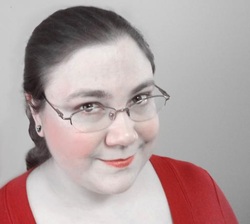 Eileen Maksym writes in a variety of genres, but her favorites are paranormal, horror, science fiction, and urban fantasy. Her first novel, Haunted, came out this past spring! She is also a submissions editor for Apex Magazine. Eileen currently lives in Tuscaloosa, Alabama, while her husband, an astrophysicist, does a post-doc at the University of Alabama. Before moving there, her sports love was baseball (GO RED SOX!) However, since football is the lingua franca around there, she started watching the team, and now she's hooked. Roll Tide!!! Eileen has two children: Kolbe, who is nine, and Josie, who is seven. They’re wonderful and exasperating and surprise her every day! When Eileen is not writing, she can often be found fangirling online about her current pop culture obsessions. Right now she is a huge fan of Elementary, Sherlock and Doctor Who. She also loves to read, sing (pretty well!) and play guitar (very badly). 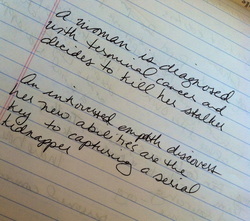 The first time I pitched, I was terrified. It was obvious – I was nearly shaking and stuttered a bit – but both of the people I pitched to were kind and encouraging. Despite the nerves, I was prepared and they both expressed their surprise that I was not already published because I knew what was expected of me. I did my research, focusing on the articles written by agents and prepared as much as possible. With the PNWA conference here, I thought I would share what I have learned. Writing Fiction? Finish Your Manuscript Non-fiction writers have different rules than fiction writers. Oftentimes, non-fiction writers can come in to a pitch with one or two polished chapters. This has a lot to do with the fact that non-fiction already has a solid conclusion. Think of a memoir – we know where that person's life ended up at the time of writing. I believe fiction writers, especially first time authors, should have a finished manuscript. I was shocked when an editor told me that the majority of the people who pitched to her were not done, and many were just pitching an idea. There are a million ways a novel can go sideways as you write a fiction piece, and it is difficult to know when the novel will be completed. Wait to pitch your book until it is finished. Update 7/20/14: I stood up at the PNWA conference and asked the panel of editors: What state should the manuscript be in when someone is pitching? It was unanimous. They all recommended that not only the manuscript be finished, but it should be beyond its first draft. This is your chance at a first impression, and you are shooting yourself in the foot if it is not your best product. Do Your Research Preparation is the key to success. Before the conference, learn who you are pitching to, which agency they are with, and their submission guidelines. Every agent listed at the writing conferences I have attended has had a bio on their agency website that details the genres they work with and their submission guidelines. Some go so far as to state that it would be prudent to draft a marketing plan, although this is rare (do it anyway – it's a great learning process and will help you speak more intelligently about your novel, target demographic, and plans for social media). It is pretty normal to start with a list of 20 agents and whittle it down to pitch to two or three. Many of the smaller conferences will have one or two agents who will listen to a pitch for any genre. I have learned that this means they will listen to pitches but only show interest within genres their agency represents. If you have a vampire book and the agent specifically states he hates vampires and no one else at the agency is interested in anything paranormal, it's probably not going to work out. And you know what? That's okay. You want an agent who enjoys working with people who write what you love. Know What To Expect If you walk into a room with an agent for your ten minute (or less) block of time, know what to expect. It flies by, so it is critical to know how to spend each of those minutes. There are fabulous articles online, many of them written by experienced agents, outlining what they look for when they meet with an individual. You should expect to spend a brief minute exchanging pleasantries (“How are you? Having a good time at the conference?”) and then jump straight into your pitch. Your pitch should be two to three sentences. If you see nods and smiles, continue on to explain your genre, answer any questions about your story, and speak to your target demographic. I suggest dressing like it is an interview and bringing a pad of paper and pen to take notes. I also bring the first chapter and a synopsis, but it's a security blanket. I rarely hear of anyone being asked for printed materials. Your Pitch A pitch is two to three sentences, and often known as an elevator pitch because it runs the amount of time you would have running from one floor to another. If you don't have their interest by then, you are in trouble and they step off to go about their day. Be sure to pitch your concept with the hook. I recommend that you read Story Engineering to get a better understanding of story structure and the differences between idea, premise, concept, and theme (my review was not entirely flattering, but I believe in what the author has to say enough to recommend it). If you don't have time to read Story Engineering, at least read this article by Larry Brooks explaining concept. Because of the complexity, I will be adding a blog post next week to help illustrate. Keep it short, stick to the point, and practice. If you think your pitch is spot on, but you are relying on Q&A and five paragraphs of follow up to get the novel sold, you aren't there yet. Watch the reaction of people who ask you what your book is about. Do they lean forward after a couple sentences and say things like, “That's really cool” or do they cross their arms, nod and say, “Interesting”? Find a way to describe your book that lets people know why you are excited about sharing it. When you find the right pitch, you will notice your demographic gets excited with you. Act Professionally This is a job interview and these people are taking time away from their home and family to listen to a lot of people pitch their book. If they are short with you, do not take it personally. Everyone has a back story (maybe they had a bad flight or the last guy went a little crazy) and they have bad days just like the rest of us. Be courteous, even if they don't like your story, and thank them for their time. Like I said, this is an interview. If they don't represent your genre or don't see the value in your concept, you are both better off parting ways. You want someone who will be able to easily represent you because they believe in you and your story. Ask Questions If things went well, make sure to write down the details for the next steps (and carry paper so you aren't scribbling on the back of their business card). If they ask for 20 pages, follow it to the letter. Do not add three more pages because of a chapter break. Ask them about their process and questions you have about the agency. It is important to remember that they are representing you - if it's not a good personality fit, you may want to keep looking. If things did not go well and you can handle critique, ask questions. Was it the concept? Is it something they hear a lot? These answers may help you figure out whether your pitch is the problem or if it's a fundamental issue with the story. Note the criticism and think on it later - when you are in a more neutral frame of mind - to determine whether or not they had a point. If you are too angry to hear a critique, smile, thank them, walk out and do some deep thinking. Not everyone is going to like your book, no matter how well you wrote it. Criticism can either be a tool to improve or a source of anguish and torture. The good news is: you get to choose how it impacts you. Do Not Badmouth It's tough to get negative feedback. A novel is a part of us, months of struggle and love poured into so many words. If you had a particularly bad pitch, wait until you have time to go outside and call a friend. Do not go to Twitter or your blog. One of the first things an agent will do when they consider signing on a writer is Google them. Be conscientious of what you put out in the internet - even if you delete a blog rant, there are ways to view the content long after it was taken down. Do not start ranting at the conference. It is a small world and you may blow up a bridge. You never know - you may have a novel in a year or two that would be perfect for the same agent. What have you learned through the pitching or query process? Please leave a comment below. Follow Camela Thompson on Twitter @CamelaThompson |
Camela ThompsonFreelance writer and Dark urban fantasy author featuring vampires with bite. My BooksCategories
All
Archives
July 2020
|
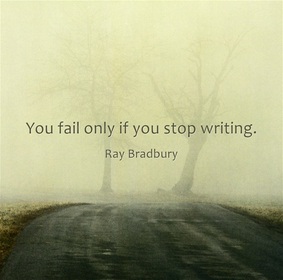
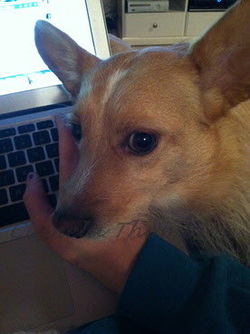

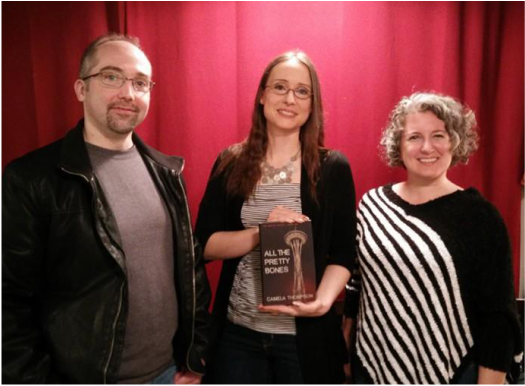
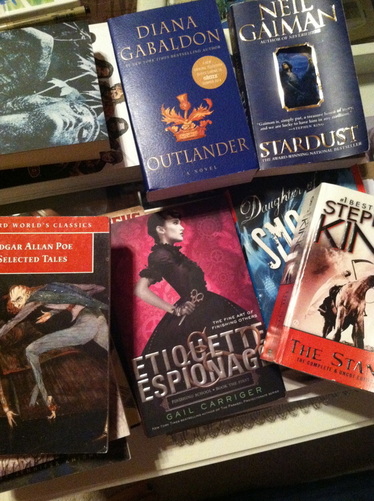
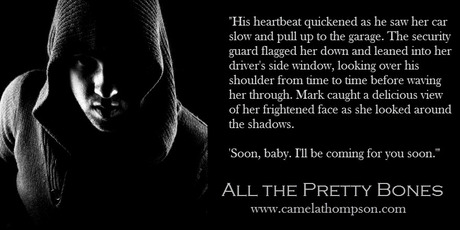
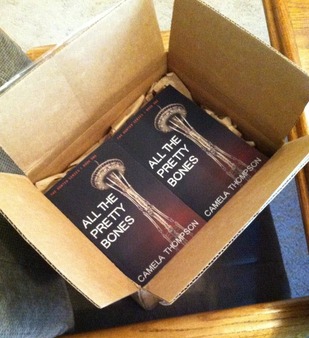


 RSS Feed
RSS Feed